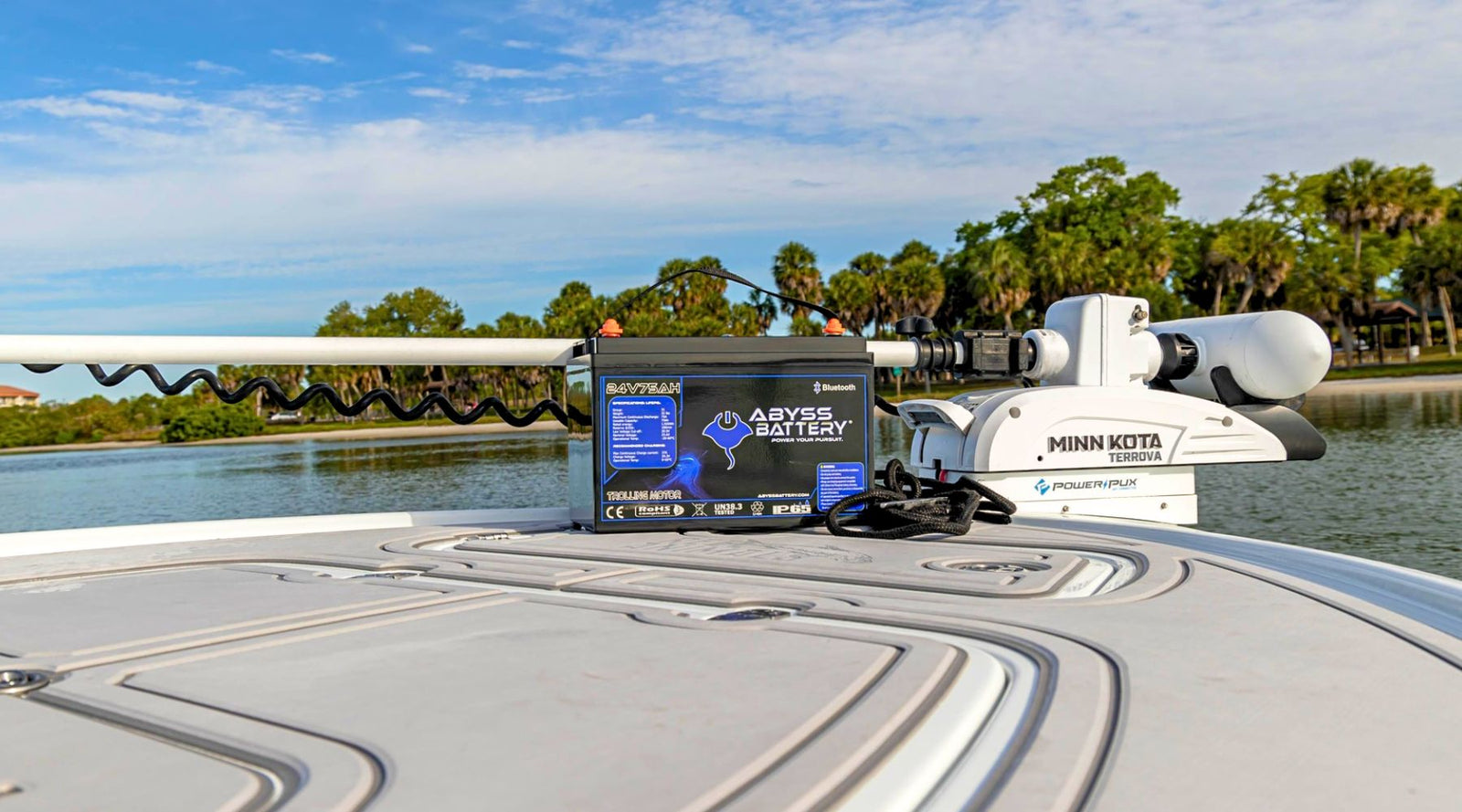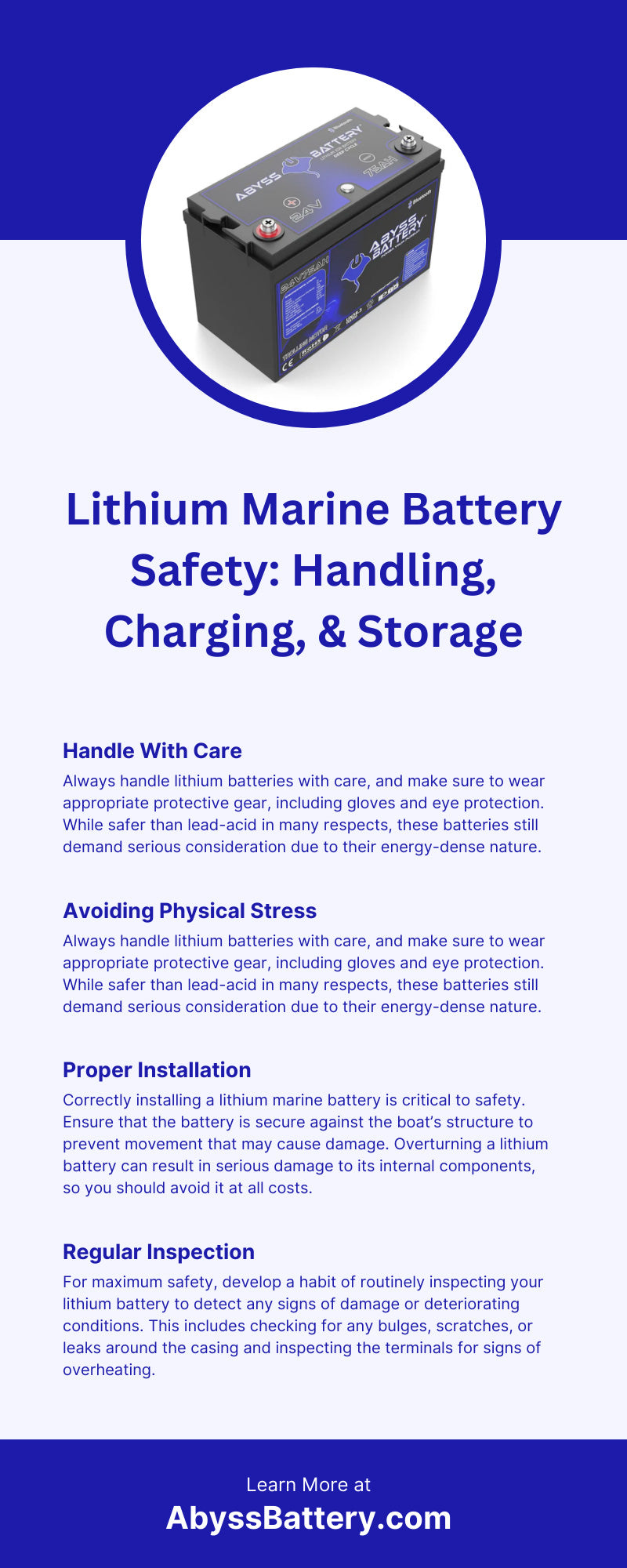Lithium Marine Battery Safety: Handling, Charging, & Storage

Boating aficionados understand well the role that a reliable battery plays in their adventures. Recent advances in marine battery technology, particularly in the realm of lithium-ion batteries, have transformed the way we power our vessels, offering benefits that improve safety, efficiency, and sustainability.
In this detailed guide, we’ll explore lithium marine battery safety, including handling, charging, and storage. Aimed at boat owners, marine enthusiasts, and the eco-conscious, this blog post will provide you with essential knowledge for a safe and enjoyable boating experience.
Setting the Course: Benefits of Lithium Over Lead-Acid
The transition from lead-acid to lithium batteries represents a significant leap forward in marine technology. A lithium-ion boat battery brings various advantages that make it the best option for modern boat owners looking to improve their overall experience.
Improved Safety
Safety on the water should always be a priority. Lithium-ion technology is inherently safer than traditional lead-acid configurations, making it an excellent choice for boaters. With features including safety valves and thermal shutdown mechanisms, the risk of explosion or electrolyte spills diminishes greatly. Lithium batteries are also less prone to the sulfation and corrosion that can occur with lead-acid varieties, ensuring peace of mind during long voyages.
Better Weight Distribution
The principle of weight distribution is vital for boat stability. At roughly a third of the weight of equivalent lead-acid batteries, lithium power packs significantly reduce the overall weight of your vessel, allowing for a smoother, more fuel-efficient ride. This also makes them easier to install in and remove from your boat when swapping cells or performing maintenance.
Unparalleled Efficiency
Unlike lead-acid batteries, lithium batteries can maintain a consistent power output throughout the discharge cycle, avoiding the common pitfall of voltage drop that can affect the operation of onboard electronics. The efficiency of lithium marine batteries comes from their remarkable charge retention and nominal voltage output, which, when combined, ensure that marine vessels operate at peak performance for longer durations.
Handling the Cell: Safe Battery Management
Properly handling lithium marine batteries requires a blend of diligence and best practices. Errors can lead to chemical exposure, fire, or even explosions. Remembering a few key guidelines will ensure you operate your boat safely during outings.
Handle With Care
Always handle lithium batteries with care, and make sure to wear appropriate protective gear, including gloves and eye protection. While safer than lead-acid in many respects, these batteries still demand serious consideration due to their energy-dense nature.
Avoiding Physical Stress
Despite their lighter weight, lithium batteries can still be heavy and awkward to maneuver. Always use the appropriate lifting techniques and tools to avoid strain or injury. Never carry a battery by its terminals or wires.
Proper Installation
Correctly installing a lithium marine battery is critical to safety. Ensure that the battery is secure against the boat’s structure to prevent movement that may cause damage. Overturning a lithium battery can result in serious damage to its internal components, so you should avoid it at all costs.
Regular Inspection
For maximum safety, develop a habit of routinely inspecting your lithium battery to detect any signs of damage or deteriorating conditions. This includes checking for any bulges, scratches, or leaks around the casing and inspecting the terminals for signs of overheating.
The Charging Port: Best Practices
Charging a lithium marine battery is a precise task that, when done incorrectly, can lead to irreversible damage or fire hazards. That’s why understanding and adhering to best practices is crucial.
Use the Right Charger
Invest in a quality charger specifically designed for lithium-ion batteries. These chargers have built-in safety features and charge algorithms that protect the battery from overcharging, which could lead to thermal runaway.
Limit Charging Speed
Lithium batteries are capable of accepting charges at a much faster rate than lead-acid batteries. However, it is essential to charge them within the manufacturer’s recommended charge rate to ensure long-term health and safety.
Monitor the Process
During charging, keep a close eye on the battery and the surrounding area. If you notice any unusual heat, odors, or noises, immediately stop the charging process and inspect the battery for signs of malfunction.
Battery Storage: Ensuring Longevity
Proper storage of lithium marine batteries is critical, especially during off-seasons or long periods of inactivity. Learning to store your lithium batteries correctly will preserve their charge and maximize their life.
Charge Before Storage
Fully charge your lithium battery before putting it into storage. Storing discharged batteries puts them at risk of sulfation, which can lead to permanent capacity loss.
Ideal Storage Conditions
The ideal storage temperature for lithium-ion batteries is between 0°C and 20°C. Extreme temperatures can reduce their performance and lifespan, so be sure to store them in a cool, dry location, away from direct sunlight and moisture.
Periodic Maintenance
Regularly check the state of charge of your stored lithium battery. If the battery has self-discharged below a safe level, recharge it to approximately 50 percent capacity to prevent degradation of the battery’s cells.
The Role of BMS and Temperature Control
Battery Management Systems (BMS) are the guardians of your lithium batteries, ensuring they operate within safe boundaries. BMS units monitor the battery’s condition and manage the charge and discharge processes to prevent overcharging or over-discharging.
Temperature control is paramount for lithium batteries. Operating them outside their recommended temperature range can reduce performance and life expectancy. Some modern lithium marine battery systems utilize active temperature control, which adjusts the battery’s internal heating or cooling to maintain optimal operating conditions.
Eco-Friendly Sailing and the Lithium Advantage
Lithium marine batteries are at the vanguard of a greener, more sustainable approach to boating. Their high energy efficiency and low toxicity make them a natural choice for conscientious sailors looking to reduce their environmental footprint.
By opting for lithium, you’re not only choosing a battery that’s safer for your boat’s operation; you’re also contributing to the overall cleanliness of our waters. Reducing the amount of lead and sulfuric acid that finds its way into our marine environments is a significant step toward achieving sustainable practices in recreational boating.
Disposal: The End of the Voyage
At the end of its lifespan, proper disposal of a lithium marine battery is just as important as its safe handling during use. Lithium batteries are a form of hazardous waste, so they should never end up in the regular trash.
Be sure to recycle your lithium marine battery at a certified recycling center. These centers have the equipment and expertise to handle the specific needs of lithium-ion batteries, repurposing the materials without posing a threat to the environment or your community.
Creating a More Enjoyable Journey
Boating has always been about balancing existing costs with new technologies. The rise of lithium marine batteries is a testament to the advancements we’re making in the field of marine technology. By learning about lithium marine battery safety, including handling, charging, and storage, boaters can safely harness the potential of lithium power for smoother, more enjoyable journeys.



Planning on purchasing a lithium battery . Is it safer to store in a basement of home or outdoor shed ?
What about fire hazard? Had a friend fishing in a bass tournament, and while fishing, the lithium battery caught in fire. Burned boat quite extensively.
Leave a comment